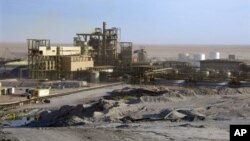One of the targets of a two-pronged terrorist attack in northern Niger on May 23 was a French-owned uranium mine. The attack damaged the facility, killed one staff member and wounded 14. One of the two al-Qaida-linked militant groups that carried out the attack in Niger also hit a European-operated natural gas plant in Algeria in mid-January, killing at least 37 hostages. There is concern that militants will continue to target high-value economic targets in the region.
Uranium is the major strategic economic interest for France in the Sahel.
France is the world's most nuclear-dependent country. Its 58 nuclear reactors produce 75 percent of the country's electricity, and about a quarter of the uranium running those plants comes from Niger, where France has been mining since 1969.
On May 23, two suicide bombers got into the French-owned Somair mine in Arlit, Niger, and exploded their vehicle. The blast damaged the grinding units, and it may take two to nine months to get the facility up and running again, at a potential loss of as much as $35 million per month.
Impact on France's Nuclear Giant
The manager of Africa risk analysis firm Strategico, Lydie Boka, says the attack on Arlit as well as the increased security risk perception could have serious consequences for both Niger and French nuclear giant, Areva, which runs the Somair mine.
She says security problems could further push back the opening of an even larger Areva mine in Niger, in Imouraren, that was supposed to open at the end of 2012 but has already been delayed to 2015. She says this would mean a loss of a significant number of jobs and revenue for Niger, as well as more big losses for Areva.
Security at the Somair mine had been reinforced twice -- once after seven workers, four of them French citizens, were kidnapped from the facility by al-Qaida in the Islamic Maghreb in 2010 and then again this year, at the start of the French-led military intervention against AQIM and other Islamist militants in northern Mali.
Boka says it is worrying that there was already increased security in place at Somair, including French special forces. She says that raises the question of complicity from inside the facility. She says companies will have to put in place more safeguards and that will be expensive, but if the investment is worth it, investors will stay because the greater the risk, the greater the return.
That risk will likely mean tighter security at work sites and hikes in insurance premiums for companies operating in the region. But analysts don't expect that to dampen investment in the oil, gas and mining sectors.
The president of Areva visited Niger the day after the attacks to reaffirm what he called "the strength of our engagement in Niger."
Areva is majority-owned by the French government.
French Foreign Minister Laurent Fabius visited Niger's capital, Niamey, the following week.
He told French expatriates gathered at the embassy that France wants to stay in Niger, because Niger is their friend and because it is a country that brings a lot to France and that also needs them. He says Niger's authorities have been "extremely brave in the fight against terrorism."
Niger has contributed troops to the French-led military intervention against al-Qaida-linked Islamist militants in northern Mali that began in January.
Western Facilities Targeted
The uranium facility in Niger is not the only majority Western-owned facility to be targeted by militants seeking revenge for that military offensive.
The "Those who Sign with Blood Brigade," led by former AQIM commander and Algerian-born militant, Mokhtar Belmohktar, raided a natural gas plant in Ain Amenas in eastern Algeria, taking 600 people hostage and ultimately killing at least 37. All but one of the dead were foreigners. The facility is a joint operation of BP, Norwegian company Statoil and the Algerian state oil company.
The facility has not been operational since the attack, according to the Algerian press.
Geoff Porter is head of North Africa Risk Consultancy, a US-based firm specializing in North Africa and the Sahara.
"We have to really reevaluate our understanding of what Belmokhtar's capabilities are. Between Ain Amenas, between Arlit/Agadez, we have to think about what's the extent of his area of operation, or his group's area of operation, and to what extent has he established local networks that he can tap or tap into at the time of his choosing. That's a really big concern," Porter said.
He says there is growing risk for extractive industries in the Maghreb. Potential targets are plentiful, in particular in Libya, which some regional leaders believed served as a rear base for the attacks in Niger and Algeria.
"Part of Salafi jihadi ideology is that you attack both the near and the far target, namely Western interests in the immediate vicinity but also the ultimate goal would be to target the West itself. The energy infrastructure represents the only really significant targets in the territory that we're talking about…if your objective is to attract attention to your grievance and to try and generate publicity for your cause. They could attack a military installation whether it's in Mali or Mauritania, but that doesn't
really resonate in the international media," Porter said.
Experts say that there are indications that the goals of the attacks in both Ain Amenas and Arlit included destroying or damaging the facilities themselves.




